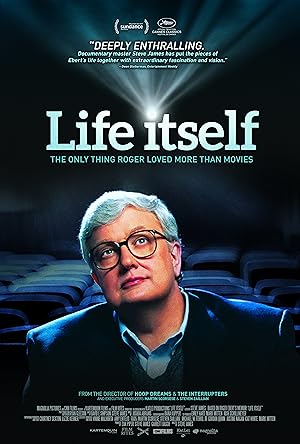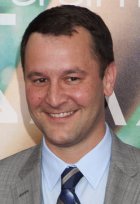
Life Itself Page #2
He could, he could knock out
a full thought out movie review
in 30 minutes.
Fast and furious.
There were so many reporters
that formed
easy quick friendships
because they were smart,
they were good writers,
they were literate,
and they could tell
a good story in a saloon.
O'Rourke's was our stage,
and we displayed
our personas there nightly.
It was a shabby street corner tavern
on a dicey stretch of North Avenue,
a block after Chicago's Old Town
stopped being a tourist haven.
When a roomer
who lived upstairs died,
his body was discovered when maggots
started to drop through the ceiling.
For many years, I drank there
more or less every night
when I was in town.
So did a lot of people.
We all sat at the same place.
The newspaper guys here,
the druggies in the middle,
the surly staff
at the very end of the bar.
Roger has always been attracted
to weird types.
I mean, you should see
some of the women
that he's hauled in
to O'Rourke's over the years.
Back in the old days,
Roger had, probably
the worst taste in women
of any man I've ever known.
They were either gold diggers,
opportunists, or psychos.
Yeah, I met Roger one time
with a woman
that looked like
a young Linda Ronstadt,
and when she was gone
from the table briefly,
I said, "Who is that?"
And he said,
"She's a hired lady."
And I said, "A hooker?"
And he said, "Now you
take care of her when I leave."
And he left town.
And anyway...
Roger, he used to hang from
the lamppost at the end of the bar.
When he got going,
Roger was one of
the finest storytellers
that I have ever come across.
He would hold court,
and it's not like everyone
was invited to join in
and have a colloquy with him.
Since he bought drinks
for everybody
when he had the money,
who's not to listen?
His great friend
was John McHugh.
And I remember
a famous argument
over who was the more cosmopolitan
of the two.
And Ebert was saying,
"John, I travel the world.
I go to every country in Europe.
I go to Cannes.
I'm a cosmopolitan person."
John said, "Ebert, you don't
even speak a foreign language."
And Ebert said,
"I speak enough to be able
to order two Johnny Walker Blacks
anywhere in the world."
Any sober human being
looking at the two of them
would have decided neither was
actually a cosmopolitan figure.
I discovered there was
nothing like drinking
with a crowd
to make you a member.
I copied the idealism
and cynicism of the reporters.
I spoke like they did.
Laughed at the same things.
Felt that I belonged.
Studs wasn't a Chicagoan.
Nelson Algren wasn't born here.
Saul Bellow wasn't born here.
But there's a certain kind
of Chicago character
that Roger really came
to believe that he was.
Roger was not just
the chief character
and star of the movie
that was his life.
He was also the director,
and he brought in the cast,
and the scenario,
and he orchestrated it.
He loved it!
Those characters, what they did.
John the garbage man.
Hank the communist.
I remember the night that Jim Touley
punched J. Robert Nash,
knocked him down
to the bar room floor,
and Nash looked up and he said,
"Nice punch, Jimmy!"
When O'Rourke's closed he would
go down to the Ale House,
because that was a four o'clock bar.
The mood got
rougher and rougher
as people got
drunker and drunker.
Roger was good at dishing,
but he also could take it.
"I'm a fat guy, I'm gonna have to
learn how to take fat stuff."
Roger could hold his own
with all of them.
Everybody kind of says that
deep down he's a nice guy.
He is a nice guy,
but he's not that nice.
He's not that nice.
The last week
he was drinking,
I even realized that there was
a serious problem going on.
Watching him
when he pulled out that night
in front of O'Rourke's,
and almost, you know,
ran into the North Avenue bus.
I remember being in the drug store
that was on the corner there
one morning,
and Roger came in, and he
looked like absolute hell.
And I'm like, "Are you okay?
What's the matter?"
"I'm on a bender.
Can you come have a drink with me?"
He said to me one time,
and I don't think
he'll regard this as a betrayal,
that he would walk home
late at night,
after O'Rourke's had closed,
and he would wish
he was dead.
once I started,
to stop after one or two.
I paid a price in hangovers.
Without hangovers,
it's possible
that I would still be drinking.
I would also be unemployed,
unmarried, and probably dead.
In August 1979,
I took my last drink.
It was about four o'clock
on a Saturday afternoon.
The hot sun streaming
through the windows.
I put a glass of scotch and soda
down on the living room table,
went to bed, and pulled
the blankets over my head.
I couldn't take it anymore.
He says, "I quit."
And then I realized
it's time for me to quit, too.
The next time I saw Roger Ebert,
he was in AA.
I was drinking very heavily.
When I decided to out myself
as a recovering alcoholic,
I hadn't taken a drink
for 31 years.
And since my first AA meeting
I attended,
I've never wanted to.
Since surgery in July of 2006,
I haven't been able to drink
at all, or eat or speak.
Unless I go insane and start
pouring booze into my g-tube,
I believe I'm reasonably safe.
That's it.
By the time I got home
from this shoot,
there was an email waiting for me.
Did we get it?
I hope so, too.
When I mentioned in my blog
that I could no longer
eat, drink, or speak,
a reader wrote,
"Do you miss it?"
Not so much, really.
long before I was aware of it.
The new reality took shape slowly.
My blog became my voice,
my outlet.
It let loose
the flood of memories.
They came pouring forth
in a flood of relief.
One day in the spring of 1967,
I noticed
Faster, Pussycat! Kill Kill!
playing at the Biograph
on Lincoln Avenue.
The posters displayed
improbably buxom women,
and I was inside in a flash.
That was when it first registered
that there was a filmmaker
named Russ Meyer.
In 1969, the 20th Century Fox
studio invited Meyer
to the lot for an interview.
They owned the rights
to the title
Beyond the Valley of the Dolls,
and offered him the title
unattached to any story.
Meyer offered me
the screenwriting job,
and I fell into
a delirious adventure.
The most impossible question
for me to answer is,
"How on earth
did Roger Ebert write
Beyond the Valley of the Dolls?"
Or be interested
in writing such a script?
Or be involved with Russ Meyer?
I have no answer.
What did he love
about Russ' films do you think?
B*obs.
The fact that there were
large breasted women involved
probably was a plus.
You know, we can talk a lot
about the art of cinema,
and what we find in it,
and the sort of the magic
and the dreams
and the glory of it,
but there are also other,
kind of, earthier appeals.
You wanna make love?
Then let's make love.
Here?
- No, in L.A.
- L.A?
- Where is that?
Translation
Translate and read this script in other languages:
Select another language:
- - Select -
- 简体中文 (Chinese - Simplified)
- 繁體中文 (Chinese - Traditional)
- Español (Spanish)
- Esperanto (Esperanto)
- 日本語 (Japanese)
- Português (Portuguese)
- Deutsch (German)
- العربية (Arabic)
- Français (French)
- Русский (Russian)
- ಕನ್ನಡ (Kannada)
- 한국어 (Korean)
- עברית (Hebrew)
- Gaeilge (Irish)
- Українська (Ukrainian)
- اردو (Urdu)
- Magyar (Hungarian)
- मानक हिन्दी (Hindi)
- Indonesia (Indonesian)
- Italiano (Italian)
- தமிழ் (Tamil)
- Türkçe (Turkish)
- తెలుగు (Telugu)
- ภาษาไทย (Thai)
- Tiếng Việt (Vietnamese)
- Čeština (Czech)
- Polski (Polish)
- Bahasa Indonesia (Indonesian)
- Românește (Romanian)
- Nederlands (Dutch)
- Ελληνικά (Greek)
- Latinum (Latin)
- Svenska (Swedish)
- Dansk (Danish)
- Suomi (Finnish)
- فارسی (Persian)
- ייִדיש (Yiddish)
- հայերեն (Armenian)
- Norsk (Norwegian)
- English (English)
Citation
Use the citation below to add this screenplay to your bibliography:
Style:MLAChicagoAPA
"Life Itself" Scripts.com. STANDS4 LLC, 2025. Web. 3 Mar. 2025. <https://www.scripts.com/script/life_itself_12550>.







Discuss this script with the community:
Report Comment
We're doing our best to make sure our content is useful, accurate and safe.
If by any chance you spot an inappropriate comment while navigating through our website please use this form to let us know, and we'll take care of it shortly.
Attachment
You need to be logged in to favorite.
Log In